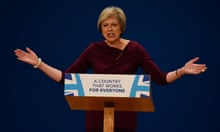Theresa May’s government is facing a growing backlash over a proposal to force companies to disclose how many foreign workers they employ, with business leaders describing it as divisive and damaging.
The proposal was revealed by Amber Rudd, the home secretary, at the Conservative party conference on Tuesday as a key plank of a government drive to reduce net migration and encourage businesses to hire British staff.
However, senior figures in the business world warned the plan would be a “complete anathema” to responsible employers and would damage the UK economy because foreign workers were hired to fill gaps in skills that British staff could not provide. One chief executive of a FTSE 100 company, whose workforce includes thousands of EU citizens, said it was “bizarre”.
The proposals, which are subject to consultation, have also been questioned from within the Conservative party. Lord Finkelstein, the Tory peer, told the BBC it was a “misstep”, while Tory MP Neil Carmichael, chairman of the House of Commons education select committee, said the policy was “unsettling” and would “drive people, business and compassion out of British society and should not be pursued any further”.
Jeremy Corbyn, the Labour leader, said: “Conservative party leaders have sunk to a new low this week as they fan the flames of xenophobia and hatred in our communities and try to blame foreigners for their own failures.
“Drawing up lists of foreign workers won’t stop unscrupulous employers undercutting wages in Britain. Shutting the door to international students won’t pay young people’s tuition fee debts, and ditching doctors from abroad won’t cut NHS waiting lists.”
Rudd was forced to defend the proposals on Wednesday, insisting they were not xenophobic and that she had been careful about the language used. The home secretary told BBC Radio 4’s Today programme that some companies were “getting away” with not training British workers and “we should be able to have a conversation about what skills we want to have in the UK”.
Rudd said that forcing companies to reveal their foreign workforce was “not something we are definitely going to do” and was part of a wider review of immigration and employment practices. But a Home Office source said Rudd was not backing away from the proposal and it would be put out for consultation despite the backlash from businesses.
Adam Marshall, the director general of the British Chambers of Commerce, said that having a global workforce should not be seen as a “badge of shame”.
He added: “Most companies do their utmost to train their workers, engage with local schools and colleges, and look for local hires before going to the overseas market – which is often an expensive and bureaucratic step.
“Businesses shouldn’t be penalised or questioned for recruiting from overseas when they have specific skills needs. Many would be very concerned if their specific circumstances were boiled down to percentages, or used to suggest that they’re somehow not doing their bit here at home.”
Manufacturers warned that foreign workers should not be regarded as a “simple statistic”.
Tim Thomas, the director of employment and skills policy at the EEF, the manufacturers’ organisation, said: “The concept of businesses reporting the number of workers who are not UK nationals will be a complete anathema to all responsible employers. Ironically, at a time when the government says it wants to extend opportunity to all and promote inclusion, this proposal will be divisive and damaging to the UK’s diverse and multicultural workforces.
“The object, it seems, is to shame those employers with a proportion of non-UK workers above some hypothetic and arbitrary level. Workers, whether UK, EU or global contribute greatly to UK industry and should be welcomed and not regarded as a simple statistic.”
Small businesses could be turned into “immigration officers” by the proposals, the Federation of Small Businesses said.
Mike Cherry, the national chairman of the FSB, said: “Fundamentally, the UK has been a global magnet for talent and this must be considered by ministers. The ability to hire the right people for the right job is paramount, and we will be championing this in the upcoming consultation.
“We also do not want to see small business owners turned into immigration officers nor encumbered by new bureaucracy.”
The Institute of Directors said businesses focused on the skills of workers rather than their nationality. Seamus Nevin, head of employment and skills policy at the IoD, said: “This is a concerning proposal from the government. The notion that employers prefer foreign workers to UK-born is wrong. Employers don’t discriminate by nationality – all that matters is the talent available.
“Immigrants are not like-for-like substitutes. They fill skills gap that cannot be filled domestically. Therefore it is hard to understand what government expects this ‘naming and shaming’ policy will achieve.”
Bosses in the technology industry warned that the plans could jeopardise the fledgling sector in Britain.
Russ Shaw, founder of Tech London Advocates, said: “This reactionary call to restrict access to global talent goes against everything we are doing to build a global tech hub that rivals Silicon Valley. One out of every three UK tech employees was born overseas, and their hard work and commitment has played an essential role in making London the capital of European tech.”
Trade union leaders also criticised the government’s “anti-immigrant sentiment” at the party conference in Birmingham.
Kamaljeet Jandu, GMB national equalities officer, said: “The UK government must not get swept away on a raft of anti-immigrant sentiment while looking for new scapegoats for their economic mistakes. Instead, it must focus on actually improving the lives of working people in this country after Brexit.”










Comments (…)
Sign in or create your Guardian account to join the discussion